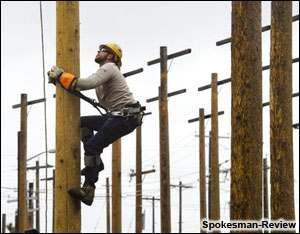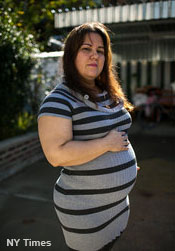NEWS ROUNDUP
Jobs to be had, funky voters, why pensions go risky…
Monday, October 20, 2014
LOCAL
 ► In the Spokesman-Review — Avista sees range of job openings over next five to 10 years — Avista employees shared their stories with local job counselors this week, with the goal of encouraging others to consider careers in the energy industry. Utilities across the country are bracing for high rates of turnover as baby boomers leave the workplace. Avista and other local utilities are forecasting openings for engineers, computer technicians, managers, lineworkers and other skilled trades in the next five to 10 years.
► In the Spokesman-Review — Avista sees range of job openings over next five to 10 years — Avista employees shared their stories with local job counselors this week, with the goal of encouraging others to consider careers in the energy industry. Utilities across the country are bracing for high rates of turnover as baby boomers leave the workplace. Avista and other local utilities are forecasting openings for engineers, computer technicians, managers, lineworkers and other skilled trades in the next five to 10 years.
► In today’s Seattle Times — Half a million jobs are coming to Washington, are we ready for them? (by Bianca Torres) — Economists project that Washington will add about 500,000 more jobs by 2022 – reassuring news for a state that is one of the fastest growing population wise in the country. Going forward, construction, an old-standby, will grow the fastest, adding about 54,300 or 39 percent more jobs to a total of 193,000 in 2022.
► At PubliCola — Poll shows Sawant polarizing but with impressive favorable rating — If you thought Socialist Seattle City Council member Kshama Sawant was bugging people with her Combat Rock rhetoric and is on her way out. Guess again!
► In the Oregonian — Dispute over longshore pay stalls shipping at Terminal 6 for two days — A dispute over pay caused a two-day shutdown that stalled the movement of inbound and outbound containers at the Port of Portland’s Terminal 6 last week. Work resumed Friday morning.
STATE GOVERNMENT
► In the P.S. Business Journal — Bigger than aerospace: Maritime industry seeks a little legislative love — State tax credits for Boeing and aerospace manufacturers have the Washington state’s maritime industrial community asking: What about us? After all, recent studies show that in 2012, the state’s maritime sector actually generated more direct and indirect jobs than aerospace: 148,000 for maritime versus 132,000 for aerospace.
► At WFSE.org — Union victory at WSU Pullman — The Skilled Trades employees at Washington State University voted 62-31 to retain the union and their Washington Federation of State Employees contract.
ELECTION
► In Sunday’s Seattle Times — Voters in a funk as politicians duck, dodge (by Danny Westneat) — Neither party is making much of a case it can solve the state’s problems. And on the biggest problems facing state government — education and transportation — we’re stuck. Voters are bored, uninspired and tuned out.
 EDITOR’S NOTE — Don’t listen to that guy! (Even if you feel that way.) If working-class people in Washington state return those ballots and support legislative candidates who support workers, we can break the gridlock in Olympia and get this state moving again.
EDITOR’S NOTE — Don’t listen to that guy! (Even if you feel that way.) If working-class people in Washington state return those ballots and support legislative candidates who support workers, we can break the gridlock in Olympia and get this state moving again.
► In today’s Washington Post — Both parties face a blue-collar imperative (by E.J. Dionne) — Democrats can’t win without a sufficient share of the white working-class vote. But Republicans have been quite effective at turning the anger that working-class whites feel about being left behind in the new economy against liberals, Democrats and especially the president.
► From McClatchy — U.S. Chamber election spending at odds with immigration push — The U.S. Chamber of Commerce publicly identifies immigration as one of its top issues, and has pledged to support candidates who favor an overhaul that includes an earned path to citizenship for those here illegally. However, the business group’s pattern of endorsements and outside spending in this year’s elections suggests that immigration may not be as important as advertised.
 ► At Think Progress — With Voter ID on hold, here’s what Wisconsin Republicans have planned for Election Day — Milwaukee County’s Republican Elections Commissioner Rick Baas warned a crowd of volunteers and supporters to be “concerned about voter fraud,” and urged the hundreds of attendees to take an “extra step of vigilance.” “You as a Wisconsin resident can challenge people who are not supposed to be voting,” he said. “You’ve got to do that.”
► At Think Progress — With Voter ID on hold, here’s what Wisconsin Republicans have planned for Election Day — Milwaukee County’s Republican Elections Commissioner Rick Baas warned a crowd of volunteers and supporters to be “concerned about voter fraud,” and urged the hundreds of attendees to take an “extra step of vigilance.” “You as a Wisconsin resident can challenge people who are not supposed to be voting,” he said. “You’ve got to do that.”
► In the NY Times — Supreme Court allows Texas to use strict Voter ID law in coming election — The Supreme Court on Saturday allowed Texas to use its strict voter identification law in the November election. The court’s order, issued just after 5 a.m., was unsigned and contained no reasoning. Justice Ruth Bader Ginsburg issued a six-page dissent saying the court’s action “risks denying the right to vote to hundreds of thousands of eligible voters.”
► In The Onion — Populist candidate gaining support among underrepresented corporations — “By presenting himself as an alternative to politicians in the pocket of the high-profile, blue-chip establishment, he has found a way to tap into the frustrations and concerns of the many ordinary corporations that have long felt alienated by the political process,” said one political science professor.
FEDERAL GOVERNMENT
► In the Washington Post — Federal pay still far behind private sector’s, study group says — White-collar federal employees on average earn 35.2 percent less than private-sector workers in comparable jobs, an advisory council announced Friday in the latest report in a years-long back and forth over how salaries stack up.
► In the Washington Post — Waiting on a Social Security disability appeal? Get in line — a very long line. — In an obscure corner of the federal bureaucracy, one single office is 990,399 cases behind. That is Washington’s backlog of backlogs — a queue of waiting Americans larger than the populations of six different states.
► At Politico — Latinos, labor tell Obama: Pick Tom Perez for AG — Hispanic lawmakers, immigration advocates and labor allies are lining up to lobby President Barack Obama to nominate Labor Secretary Tom Perez as attorney general.
NATIONAL
 ► In the NY Times — Doctor says no overtime; pregnant worker’s boss says no job — Angelica Valencia had worked at Fierman Produce for three years. She earned $8.70 an hour, a salary that she and her husband, a driver for a private bus company, counted on to pay bills and cover expenses on their studio apartment in Queens. With a baby on the way, that paycheck was even more precious. But when Valencia told her supervisors in July that she had a high-risk pregnancy, they told her she could work only without restrictions. Then her supervisors insisted that she work overtime, despite a note from her doctor telling her she couldn’t.
► In the NY Times — Doctor says no overtime; pregnant worker’s boss says no job — Angelica Valencia had worked at Fierman Produce for three years. She earned $8.70 an hour, a salary that she and her husband, a driver for a private bus company, counted on to pay bills and cover expenses on their studio apartment in Queens. With a baby on the way, that paycheck was even more precious. But when Valencia told her supervisors in July that she had a high-risk pregnancy, they told her she could work only without restrictions. Then her supervisors insisted that she work overtime, despite a note from her doctor telling her she couldn’t.
► At AFL-CIO Now — Remember the Rosie the Riviter image pretty much everybody knows? It’s not what you might think — Rosie the Riveter was not really just one person. She was a composite of all of the women who went to work, many for the first time, during World War II. These were the jobs that men used to do — factories, assembly lines, welding, taxicab drivers, business managers and much more. Some 6 million women became Rosies all over the country. From 1940 to 1945, the female workforce grew by 50%.
TODAY’S MUST-READ
 ► In the Washington Post — Why pension funds go to risky investments (by Michael McCarthy) — It’s widely known that other advanced democracies levy higher taxes to operate social programs and maintain infrastructure. What is less known is that some governments also rely on another source of social investment: retirement funds. For example, in Quebec, the Levesque government created the Solidarity Fund in 1983 to channel retirement assets into the provincial economy while also saving for the Québécois. The fund invests in small and medium enterprises that operate within the province. According to their calculations, by 2012, the Solidarity Fund’s investments created 86,624 new jobs and kept 81,993 more from moving overseas.
► In the Washington Post — Why pension funds go to risky investments (by Michael McCarthy) — It’s widely known that other advanced democracies levy higher taxes to operate social programs and maintain infrastructure. What is less known is that some governments also rely on another source of social investment: retirement funds. For example, in Quebec, the Levesque government created the Solidarity Fund in 1983 to channel retirement assets into the provincial economy while also saving for the Québécois. The fund invests in small and medium enterprises that operate within the province. According to their calculations, by 2012, the Solidarity Fund’s investments created 86,624 new jobs and kept 81,993 more from moving overseas.
Pension funds could play a similar role in America, but they don’t. Instead, U.S. pension funds mimic Wall Street investment practices. In recent years, this led them to follow everyone else into the toxic sub-prime mortgage market. With $11 trillion of assets on the eve of the Great Recession, pensions helped bankroll risky investments that undermined the financial security of their own beneficiaries — the very people they were bound to protect.
Neither of the usual policy suspects, lack of regulatory oversight or poor enforcement, explains why pension funds are channeled into risky investments and don’t play a greater role in social investment. In fact, my research shows that the opposite is true. Tighter, not looser, regulations led to more speculative use of America’s retirement savings.
The Stand posts links to Washington state and national news of interest every weekday morning by 10 a.m.





